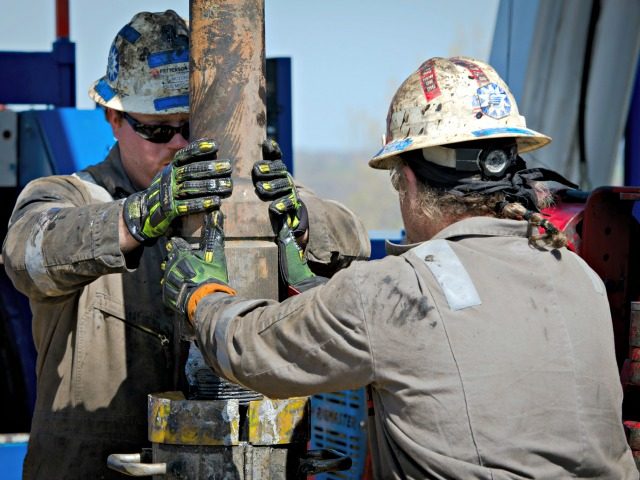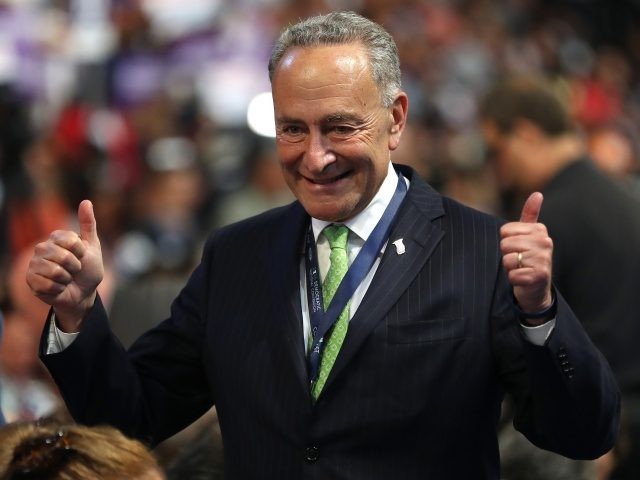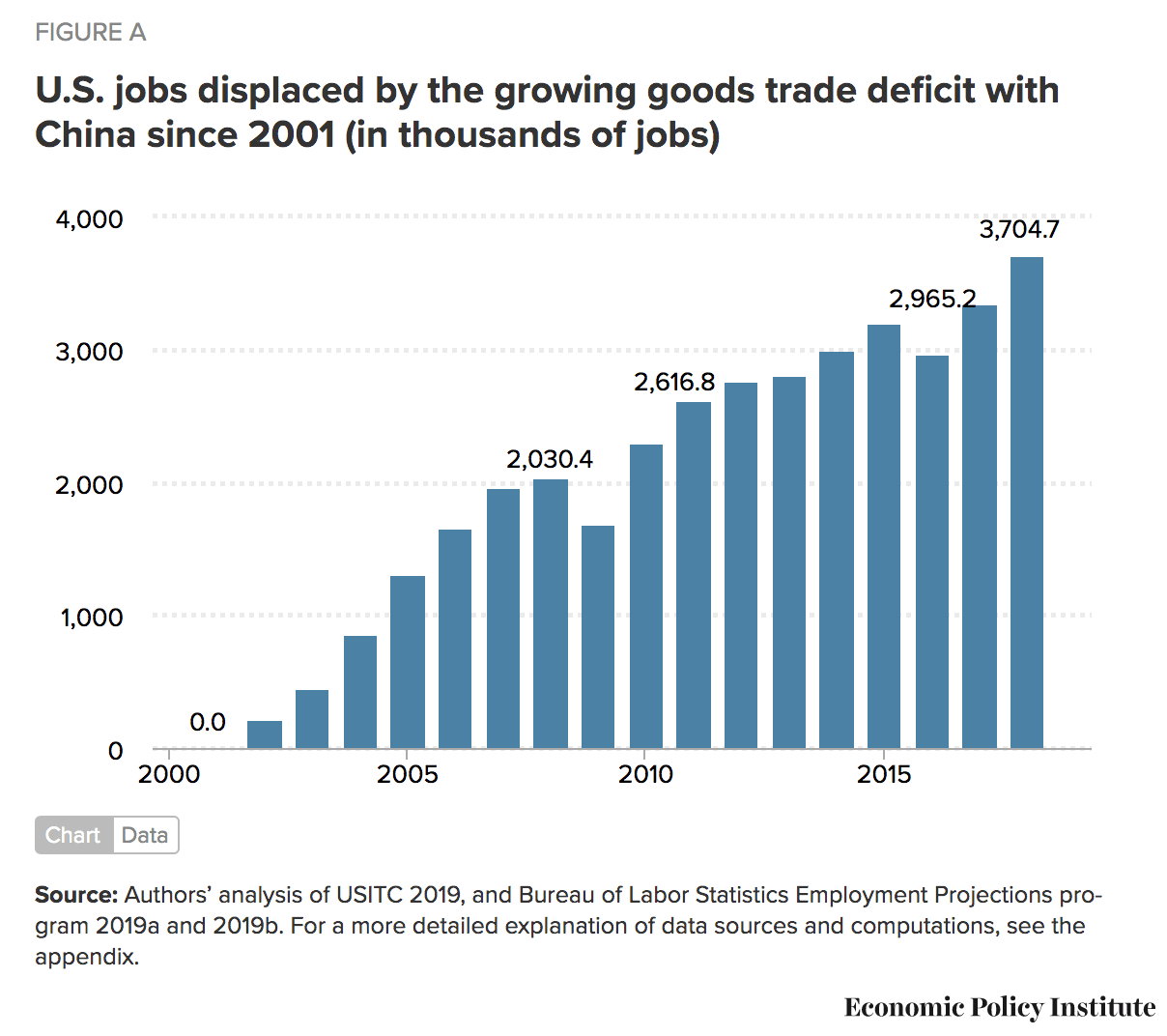As the Wall Street Journal editorialized, “Behold Big Business colluding with Big Government to grab subsidies and raise consumer prices,” a form of “corporate socialism, or state capitalism.” This unholy alliance calls to mind the “military-industrial complex” Dwight Eisenhower warned about in 1961, a warning still pertinent today.
Surviving an Unlivable Wage | Full Documentary
What Happened To The American Middle Class? | Financial Crash Documentary | Business Stories
Don’t be fooled by Joe Biden
Chris Hedges | NAFTA, Clinton, and Obama BETRAYED Americans... and Joe Biden was right there with the worst of them!
Progressives’ 'Green Energy' Boondoggle Based on Fantasy and Greed
The unholy alliance of Big Business and Big Government.
22 comments
Bruce Thornton is a Shillman Journalism Fellow at the David Horowitz Freedom Center.
Last Thursday Joe Biden posed for a photo op with representatives from automobile manufacturers. They gathered there to mark the Biden administration’s plan to raise the miles-per-gallon standard that gasoline powered vehicles must achieve––52 MPG by 2026. The compensation for automakers will comprise more regulatory credits for carmakers and subsidies for electric vehicle (EV) consumers, which will lead to higher prices for trucks and SUVs to offset their losses on EVs. This means consumers of those popular vehicles will be subsidizing EV drivers. And more taxpayer money will go to increasing available electricity, providing more and faster charging stations, and improving battery capacity.
As the Wall Street Journal editorialized, “Behold Big Business colluding with Big Government to grab subsidies and raise consumer prices,” a form of “corporate socialism, or state capitalism.” This unholy alliance calls to mind the “military-industrial complex” Dwight Eisenhower warned about in 1961, a warning still pertinent today.
At least during the Cold War a nuclear-armed Soviet Union posed an existential threat that justified cooperation between politics and the armaments industries. Today, the purveyors of anthropogenic, catastrophic global warming (ACGW) ––the more accurate label masked by the euphemism “climate change”–– are using a dubious theory riddled with uncertainty to justify such crony capitalist policies. The challenges to ACGW in the last few decades have exposed those uncertainties and the dubious “science” proponents claim to be “settled,” and so can justify spending trillions of taxpayer dollars,
For example, MIT professor of atmospheric science Richard Lindzen, and Princeton emeritus professor of physics William Happer have written, “We are both scientists who can attest that the research literature does not support the claim of a climate emergency. Nor will there be one. None of the lurid predictions — dangerously accelerating sea-level rise, increasingly extreme weather, more deadly forest fires, unprecedented warming, etc. — are any more accurate than the fire-and-brimstone sermons used to stoke fanaticism in medieval crusaders.” So too physicist Steven E. Koonin, who writes in his new book Unsettled. What Climate Science Tells Us, What it Doesn’t, and Why It Matters, “The science is insufficient to make useful projections about how the climate will change over the coming decades, much less what effect our actions will have on it.”
On top of the contested rationale for pouring billions of tax-payer dollars into one industry, the logistics of enlarging electricity production for “green” technology like wind turbines, solar panels, and half-ton batteries for EVs, not to mention expanding exponentially the electrical grid, are formidable, as Mark Mills has reported:
Building one wind turbine requires 900 tons of steel, 2,500 tons of concrete and 45 tons of nonrecyclable plastic. Solar power requires even more cement, steel and glass—not to mention other metals. Global silver and indium mining will jump 250% and 1,200% respectively over the next couple of decades to provide the materials necessary to build the number of solar panels, the International Energy Agency forecasts. World demand for rare-earth elements—which aren’t rare but are rarely mined in America—will rise 300% to 1,000% by 2050 to meet the Paris green goals. If electric vehicles replace conventional cars, demand for cobalt and lithium, will rise more than 20-fold. That doesn’t count batteries to back up wind and solar grids.
The “green energy” promoters also ignore other costs. Building solar and wind farms requires much more land than does fossil fuel production, with a greater destructive impact on the environment. Mining the rare-earth minerals like cobalt and lithium necessary for EV batteries leaves behind toxic waste, pollution, damage to wildlife habitats, and lunar landscapes. Reductions in carbon emissions that come from EVs are greatly offset by the fossil-fuel powered big machinery and coal- or natural gas-powered electricity used in mining these minerals.
And there are the human costs. The bulk of these mines and processing facilities are in countries like China, which controls 90% of cobalt refining, and the Republic of Congo, which produces 70% of raw cobalt, that do not have labor protections like those in the West. About 40,000 children, some as young as four years old, are working long hours in Congolese cobalt mines. Imagine how many more children or political prisoners will be slaving away to meet the increased demands for the batteries necessary for Biden’s EV “green” dreams to be realized.
Similar fossil-fuel use attend wind turbines. As Mills points out, “Building enough wind turbines to supply half the world’s electricity would require nearly two billion tons of coal to produce the concrete and steel, along with two billion barrels of oil to make the composite blades.” The amount of land necessary for both solar and wind farms would be enormous, with environmental damage to wild life habitats. And NIMBY coastal dwellers are unlikely to agree to 850-foot tall wind turbines sullying their ocean views and making mincemeat of sea birds.
The biggest problem with EVs, however, is that apart from the high-end Tesla, they are not popular with the average driver, which is why consumers have to be bribed with taxpayer money to buy them. As the Journal reports, “EVs remain impractical for many drivers who live outside cities,” given that “batteries need to be recharged every 200 to 300 miles, which can take at least 30 minutes even with today’s fastest chargers. Most people don’t want to wait that long when they’re on the road.”
Building more charging stations, which the Biden plan proposes, is not as easy a fix for that problem as he seems to think. More charging stations means a much larger capacity electrical grid, a gargantuan task if “clean energy” regulations must be followed. Also as last year’s rolling blackouts in California and this year’s blackouts in Texas remind us, “clean” solar and wind energy obviously doesn’t work at night or when the wind doesn’t blow.
This requires millions of half-ton backup batteries to store energy when the sun doesn’t shine and the wind doesn’t blow, and a larger grid to deliver it. As of now, about 12% of U.S. energy comes from renewable sources, and of that 12%, 26% comes from the sun, and 11% from wind. This scant percentage of our energy production means some pretty spectacular advances in battery design and transmission line production and installation will have to happen to meet the “green energy” lobby’s fantastical goal to eliminate 80% of hydrocarbons by 2030, and 100% by 2050.
Furthermore, as Paul Driessen writes, “Generating all that electricity without new nuclear and hydroelectric plants would require tens of thousands of 850-foot-tall offshore wind turbines, hundreds of thousands (perhaps millions) of somewhat smaller onshore turbines, and billions of photovoltaic solar panels. Backing up sufficient nationwide electricity for even one week of windless, sunless days would involve well over a billion battery modules. Connecting all this and our cities would require thousands of miles of new transmission lines.”
And don’t forget, building any large-scale infrastructure in the U.S. incurs exorbitant costs in time and money because of multitudes of government regulations from environmental protection rules to hiring and contracting requirements. Boston’s Big Dig highway tunnel and California’s high-speed rail project are monuments to the waste and inefficiencies of such projects. And how will all these transmission lines and billions of solar panels and millions of wind turbines be constructed without using machines powered by fossil fuels, and electricity produced from natural gas and coal? Believing that all these miracles can happen by 2050––a mere ten years longer than it took for Boston’s Big Dig–– is a fantasy, albeit a lucrative one for the industries getting the subsidies.
Finally, these “green energy” solutions to impending ACGW doom even if accomplished will not make a difference in slowing temperature rises and the alleged catastrophes that will follow. For whatever reductions in emissions the West achieves, the rest of the world, especially China and India––the world’s first and third largest emitters––will undo. And why should developing nations that need cheap electricity and fossil fuels to expand their economies, condemn their peoples to the misery and diseases of poverty just because the well-nourished, rich West indulges its Disneyesque fantasies about Mother Nature, and its faddish distaste for icky, low-brow industries?
“Green energy” and “renewable energy” are mere marketing phrases like “all natural” and “organic.” They provide cover for industries partnering with government and lining up to get their share of the taxpayer money Biden promises to shovel over to them.
More important are the dangers of such collusion and concentration of power. Eisenhower’s warnings about the “military-industrial complex” are, mutatis mutandis, pertinent to the sort of political-economic collusion we are witnessing today:
In the councils of government, we must guard against the acquisition of unwarranted influence, whether sought or unsought, by the military-industrial complex. The potential for the disastrous rise of misplaced power exists and will persist. We must never let the weight of this combination endanger our liberties or democratic processes. We should take nothing for granted. Only an alert and knowledgeable citizenry can compel the proper meshing of the huge industrial and military machinery of defense with our peaceful methods and goals, so that security and liberty may prosper together.
As always, in the end the buck stops with We the People.
Senate Republicans Greenlight Outsourcing of U.S. Manufacturing Jobs with Infrastructure Bill Passage

A group of 19 Senate Republicans helped greenlight outsourcing of American manufacturing jobs with the passage of the so-called bipartisan infrastructure bill that provides giant carve-outs for industries to bypass “Buy American” rules.
On Tuesday, 19 Senate Republicans joined Senate Democrats in a 69-30 vote to pass the Infrastructure Investment and Jobs Act. Those Senate Republicans include:
Dan Sullivan (R-AK), Shelley Moore Capito (R-WV), Mike Crapo (R-ID), Roy Blunt (R-MO), Richard Burr (R-NC), Deb Fischer (R-NE), Lindsey Graham (R-SC), Rob Portman (R-OH), Thom Tillis (R-NC), Lisa Murkowski (R-AK), Jim Risch (R-ID), Chuck Grassley (R-IA), Bill Cassidy (R-LA), Kevin Cramer (R-ND), Roger Wicker (R-MS), Mitch McConnell (R-KY), John Hoeven (R-ND), Susan Collins (R-ME), and Mitt Romney (R-UT)
As Breitbart News reported, the bill allows the heads of federal agencies to issue waivers to corporations to work around Buy American requirements if they consider the requirement “inconsistent with the public interest,” does not meet “satisfactory quality,” or if they believe buying American will increase costs for the projects.
The bill reads:
The head of a Federal agency that applies a domestic content procurement preference under this section may waive the application of that preference in any case in which the head of the Federal agency finds that:
- applying the domestic content procurement preference would be inconsistent with the public interest;
- types of iron, steel, manufactured products, or construction materials are not produced in the United States in sufficient and reasonably available quantities or of a satisfactory quality; or
- the inclusion of iron, steel, manufactured products, or construction materials produced in the United States will increase the cost of the overall project by more than 25 percent.
The waivers will only be reviewed every five years, according to the bill, and will have to be justified in the Federal Register with a public comment period of no fewer than 30 days.
Due to China’s dominance in steel and manufacturing, the carve-outs are likely to be a massive benefit for corporations in China that often are linked to the Chinese Communist Party and party officials.
Republican support for the infrastucture plan, with the Buy American waivers included, comes even as Republican and conservative voters increasingly oppose foreign imports — considering them a threat to the nation’s domestic manufacturing industries — and huge opposition to China’s economic rise.
In April, 51 percent of Republican voters told Gallup pollsters they held a negative view of foreign trade, specifically foreign imports, seeing it as a threat to the U.S. economy. By comparison, in the year 2000, 59 percent of Republican voters had a positive view of foreign trade.
Meanwhile, the latest Pew Research Center survey finds that Republicans who now say that limiting China’s influence and power is a top priority has increased from 39 percent in 2018 to 63 percent in 2021. The loss of American jobs to China remains one of Americans’ biggest concerns with the communist county, the survey reveals.
From 2001 to 2018, U.S. free trade with China has eliminated at least 3.7 million American jobs. In 1985, before China entered the WTO, the U.S. trade deficit with China totaled $6 billion. In 2019, the U.S. trade deficit with China totaled more than $345 billion.
American manufacturing is vital to the U.S. economy, as every one manufacturing job supports an additional 7.4 American jobs in other industries.
John Binder is a reporter for Breitbart News. Email him at jbinder@breitbart.com. Follow him on Twitter here.
Democrats: Passage of Infrastructure Bill Is Step Toward Massive Amnesty

Senate and House Democrats are relishing in the passage, with the help of 19 Senate Republicans, of a so-called bipartisan infrastructure bill which they see as a building block toward a massive amnesty plan for millions of illegal aliens.
On Tuesday, in a 69-30 vote, 19 Senate Republicans joined all 50 Senate Democrats to pass the Infrastructure Investment and Jobs Act, which does not include a provision to ensure American infrastructure jobs go to American citizens rather than illegal aliens.
Those 19 Senate Republicans include:
Dan Sullivan (R-AK), Shelley Moore Capito (R-WV), Mike Crapo (R-ID), Roy Blunt (R-MO), Richard Burr (R-NC), Deb Fischer (R-NE), Lindsey Graham (R-SC), Rob Portman (R-OH), Thom Tillis (R-NC), Lisa Murkowski (R-AK), Jim Risch (R-ID), Chuck Grassley (R-IA), Bill Cassidy (R-LA), Kevin Cramer (R-ND), Roger Wicker (R-MS), Mitch McConnell (R-KY), John Hoeven (R-ND), Susan Collins (R-ME), and Mitt Romney (R-UT)
Now, House and Senate Democrats are saying the passage of the infrastructure bill is vital to passing their $3.5 trillion budget resolution which, among other things, would give amnesty to millions of illegal aliens enrolled and eligible for the Deferred Action for Childhood Arrivals (DACA) program, foreigners with Temporary Protected Status (TPS), those working on farms, and those considered “essential” workers.
The amnesty would cost American taxpayers around $107 billion, though the cost in depressed and lost wages for the nation’s working and middle class would likely boost that estimate significantly.
On August 9 on the Senate floor, Senate Majority Leader Chuck Schumer (D-NY) made clear to Senate Republicans that Democrats’ end goal was to pass the infrastructure bill to then pass the multi-trillion dollar budget with amnesty.
“As we move forward, we’re proceeding on both tracks — the track of the bipartisan infrastructure proposal and the track of the budget resolution with reconciliation instructions,” Schumer said.
Sen. Jim Banks (R-IN), chairman of the Republican Study Committee, warned Senate Republicans that by withholding votes for the infrastructure bill, the GOP was also stopping in its tracks the Democrats’ amnesty plan.
Rep. Ayanna Presley (D-MA) suggested in an interview with National Public Radio that she will consider voting against the infrastructure bill unless the Senate passes the Democrats’ budget resolution with amnesty:
What progressives have been clear about since day one, as has President Biden, as has Democratic leadership, is that any vote on the narrow bipartisan infrastructure package must also come with a movement on a massive investment in tandem for workers and families.
“And that’s care economy, housing, combating climate change, and a pathway to citizenship for millions of our immigrant neighbors,” Presley continued.
Similarly, Sen. Alex Padilla (D-CA) said Senate Democrats would “continue our work to deliver even bolder investments in child & elder care, immigration, and climate action” after passing the infrastructure bill.
House Speaker Nancy Pelosi (D-CA) solidified on Wednesday that the infrastructure bill is directly tied to Democrats’ budget framework with amnesty, telling the media that she will not allow a vote in the House on the infrastructure bill until the Senate passes the budget.
“The votes in the House and Senate depend on us having both bills,” Pelosi said.
Already, Pelosi is facing backlash from her caucus with swing district House Democrats asking her to untie the infrastructure bill from the Democrat budget with amnesty.
“This is part and parcel,” Sen. Bill Hagerty (R-TN) told SiriusXM Patriot’s Breitbart News Daily. “It’s a two-part plan to transform America, as Bernie Sanders has said. He’s been the author of this, and what we’re seeing is the actual realization of Joe Biden’s promise during the campaign to transform America.”
Hagerty, along with 29 other Senate Republicans, voted against the infrastructure bill.
John Binder is a reporter for Breitbart News. Email him at jbinder@breitbart.com. Follow him on Twitter here.

No comments:
Post a Comment